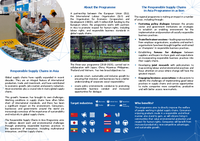Contributions Overview
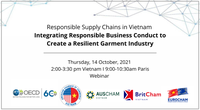
OECD, in collaboration with business associations in Viet Nam AmCham, AusCham, BritCham and EuroCham, is holding a series of webinars on building resilient supply chain in the context of Viet Nam. The first webinar “Integrating Responsible Business Conduct to Create a Resilient Garment Industry” will include a brief presentation of the OECD’s Garment & Footwear Due Diligence Guidance (which will be launched in Vietnamese during the webinar), how it can help Vietnamese businesses become more resilient and future proof their place in the global supply chain. Language: Vietnamese-English simultaneous interpretation will be available. Tổ chức Hợp tác Kinh tế và Phát triển (OECD), phối hợp với các hiệp hội doanh nghiệp tại Việt Nam EuroCham, AmCham, AusCham, và BritCham, thực hiện tổ chức chuỗi hội thảo trực tuyến về xây dựng chuỗi cung ứng linh hoạt tại Việt Nam. Hội thảo trực tuyến đầu tiên chủ đề “Tích hợp Ứng xử Kinh doanh có Trách nhiệm cho Nâng cao sức Chống chọi cho Ngành May mặc và Da giầy” sẽ nhìn theo lăng kính từ Hướng dẫn về tính chăm chỉ về may mặc và giày dép của OECD (bản tiếng Việt sẽ được công bố trong hội thảo trên), nhận định các phương pháp giúp đỡ doanh nghiệp Việt Nam trở nên linh hoạt hơn và khẳng định vị trí của mình trong chuỗi cung ứng toàn cầu. Tầm quan trọng của việc sắp xếp lại các chuỗi cung ứng toàn cầu đã được nhìn nhận rõ qua ảnh hưởng từ COVID-19 tới tất cả đối tượng kinh tế. Việc áp dụng các tiêu chuẩn về Ứng xử Kinh doanh có Trách nhiệm (RBC) có thể giúp các doanh nghiệp trở nên linh hoạt hơn khi gặp phải sự gián đoạn của Chuỗi giá trị toàn cầu. RBC tích hợp, xem xét các vấn đề môi trường và xã hội trong các hoạt động kinh doanh cốt lõi, bao gồm trong toàn bộ chuỗi cung ứng. Yếu tố chính của RBC là thẩm định dựa trên rủi ro – một quá trình mà thông qua đó các doanh nghiệp xác định, ngăn chặn và giảm thiểu các tác động bất lợi thực tế và tiềm ẩn của họ đối với con người và hành tinh – và giải thích cách giải quyết các tác động đó. Hội thảo trên trực tuyến quy tụ các diễn giả ngành may mặc và da giầy bao gồm các nhà hoạch định chính sách, hiệp hội doanh nghiệp, các công ty toàn cầu và trong nước, và đại diện công đoàn. Hội thảo sẽ dành phiên Tham vấn Kinh doanh cho các công ty và nhà sản xuất có thể chia sẻ kinh nghiệm và đặt câu hỏi trực tiếp với OECD và các diễn giả khác. Ngôn ngữ: thông dịch song song Việt-Anh.
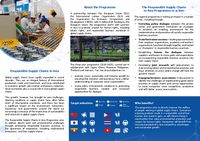
Promoting Responsible Supply Chains in Asia
A partnership between the European Union (EU), the International Labour Organization (ILO) and the Organisation for Economic Co-operation and Development (OECD), with 9 million EUR funding by the European Union, the programme works with partners in Asia to promote respect for human rights, including labour rights, and responsible business standards in global supply chains.
How can fashion brands mitigate the negative impacts of the COVID-19 pandemic on garment workers?
With the COVID-19 pandemic provoking a global health and economic emergency, the OECD’s Dorothy Lovell looks at how OECD guidance on responsible business conduct can help governments and business address the impacts of COVID-19 in a way that mitigates harm to workers and supply chains in the garment sector.

The OECD e-learning Academy on Responsible Business Conduct
The OECD e-learning Academy on Responsible Business Conduct (RBC) provides learners with a unique opportunity to advance their knowledge on responsible business conduct and OECD risk-based due diligence. Through the Essentials of OECD Due Diligence for RBC course launched in August 2021, you will learn about: International expectations on RBC and why business should care; Characteristics of the OECD due diligence approach including how it can be tailored to a company’s circumstances; and Key elements of OECD risk-based due diligence including recommendations to prioritise risks and engage with stakeholders for effective due diligence. Learners are strongly encouraged to complete the Essentials of OECD Due Diligence for RBC course to optimise the learning experience with the forthcoming OECD Due Diligence for Garment and Footwear Supply Chains course (available later in 2021) that explore how due diligence works in the sector. The OECD e-learning Academy on RBC is open to all stakeholders interested in learning about RBC and risk-based due diligence, at no cost.

Save the date - 2022 OECD Forum on Due Diligence in the Garment and Footwear Sector
More information coming soon.
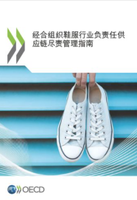
经合组织鞋服行业负责任供应链尽责管理指南 《经合组织鞋服行业负责任供应链尽责管理指南》帮助企业在鞋服行业供应链上实施《经合组织跨国企业准则》中包含的尽责管理建议,以避免并消除自身活动与供应链造成的潜在负面影响。《指南》支持《经合组织跨国企业准则》确定的各项目标,以确保鞋服行业企业的运营符合政府政策,从而巩固企业与运营所在地社会相互信任的基础。《指南》还将支持企业实施《联合国工商企业与人权指导原则》中包含的尽责管理建议。《指南》与《国际劳工组织关于工作中基本原则和权利宣言》、 相关国际劳工组织公约和建议书及《国际劳工组织关于跨国企业和社会政策原则的三方宣言》保持一致。《指南》结合针对特定风险领域的尽责管理模块,为企业在鞋服行业中负责任运营和采购提供一揽子完整的指导。《指南》经由多利益相关方过程制定,得到经合组织成员国和非经合组织成员国,商界、工会、民间社会代表的深度参与,接受负责任商业行为工作组的监督。《指南》以实践为导向,强调通过合作、建设性的方式,应对复杂的挑战。《指南》基于法国和意大利国家联络点有关在鞋服行业实施《经合组织准则》的深度报告,对2013年6月和2014年各国家联络点在孟加拉拉纳广场悲剧性倒塌事件发生后所作的声明做出回应。
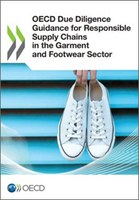
OECD Due Diligence Guidance for Responsible Supply Chains in the Garment & Footwear Sector
Adopted in 2017, the OECD Due Diligence Guidance for Responsible Supply Chains in the Garment and Footwear Sector establishes a common understanding of due diligence in the sector to help companies meet the due diligence expectations laid out in the OECD Guidelines for Multinational Enterprises. The Guidance is available for download in nine languages, including Chinese mandarin and Japanese.

